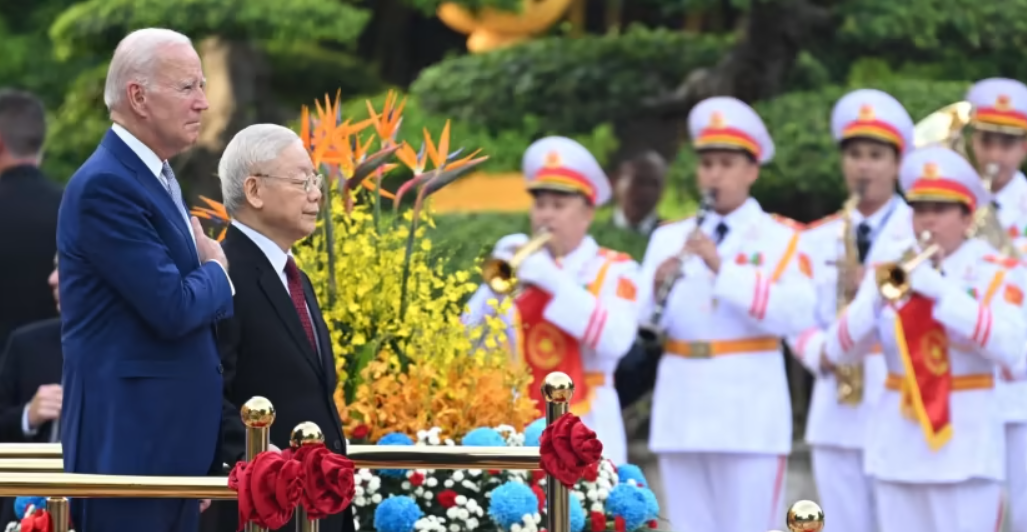President Joe Biden kicked off his short Vietnam visit by expressing the potential for both nations to influence the Indo-Pacific’s future and his hopes for progress on climate, the economy, and more.
In the lead-up to his crucial visit to Vietnam, President Joe Biden took a moment to commemorate a contrasting era in U.S.-Vietnamese history. In a ceremony held at the White House, Biden bestowed the Medal of Honor upon 81-year-old Larry Taylor, a retired army captain who had piloted a Cobra attack helicopter during the intense conflict of the Vietnam War in 1968. This poignant gesture served as a reminder of the complex historical relationship between the two nations, as they now work towards enhancing trade and fostering closer diplomatic ties during the president’s upcoming visit.
As Biden arrives at Hanoi’s Noi Bai International Airport on Sunday, he enters a Vietnam vastly transformed and a relationship with a former wartime adversary that has undergone remarkable changes.
Vietnam is upgrading its relationship with the United States to the level of a comprehensive strategic partner, a designation considered by one of Biden’s senior national security advisors as Vietnam’s most significant level of international partnership. This move aligns the U.S. with other nations like China and Russia who have received the same status from Vietnam, signifying Vietnam’s intent to diversify its international alliances as U.S. and European businesses explore alternatives to Chinese manufacturing facilities.
Vietnam and the United States have previously entered into a “comprehensive partnership,” and there has been speculation surrounding the possibility of elevating their relationship to the highest tier of a “comprehensive strategic partnership,” which is the most esteemed level in Vietnam’s diplomatic hierarchy, according to Le Hong Hiep, a senior fellow and coordinator of the Vietnam Studies Programme at the ISEAS – Yusof Ishak Institute in Singapore.
If such an elevation were to take place during Biden’s visit, it would constitute a significant breakthrough in their bilateral relations, as highlighted by Hiep in a recent article for the ISEAS Fulcrum online magazine. Hiep further explained that Vietnam only forms such strategic partnerships with nations it deems crucial for its security, economic prosperity, and international standing.
Biden is set to hold discussions with the top leaders of Vietnam’s Communist Party and is anticipated to ink agreements aimed at elevating U.S. relations with Hanoi to their utmost potential.
“This visit is a remarkable step in the strengthening of our diplomatic ties,” according to US National Security Advisor Jake Sullivan. “It reflects the leading role that Vietnam will play in our growing network of partnerships in the Indo-Pacific,” Sullivan added.
While diplomatic relations and trade take precedence in the planned meeting between Biden and Vietnam’s influential leader, Communist Party General Secretary Nguyen Phu Trong, Washington is also closely monitoring China’s growing economic and military influence in the Asia Pacific region.
China will closely monitor Biden’s visit, evaluating whether Vietnam’s efforts to strengthen ties with the United States diminish Beijing’s sway in Hanoi or modify strategic interests with its southern neighbor.
As China experiences an economic deceleration and President Xi Jinping consolidates political authority, President Biden perceives a chance to expand America’s sphere of influence by engaging more countries, such as Vietnam and Cambodia.
Biden received a grand and ceremonial welcome outside the mustard-colored Presidential Palace, where numerous schoolchildren lined the steps, enthusiastically waving small U.S. and Vietnamese flags. From an elevated review platform, he observed the precise military march of servicemembers. Before departing for a meeting at the Communist Party headquarters with Trong, the president extended a friendly wave to the children.
Biden and Trong both shared their delight at reuniting, noting that their last encounter took place around eight years ago in Washington when Biden was serving as vice president.
(Source: Kevin Doyle | Sen Nguyen | Aljazeera | Josh Boak | Aamer Madhani | AP)









